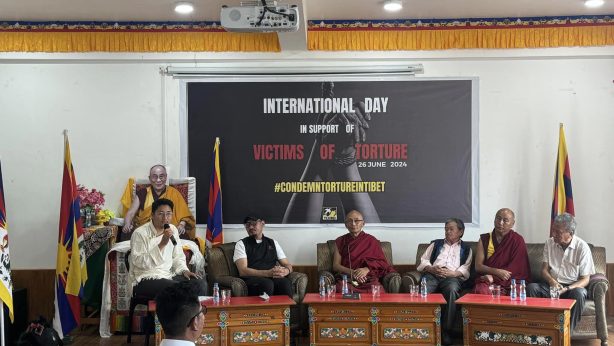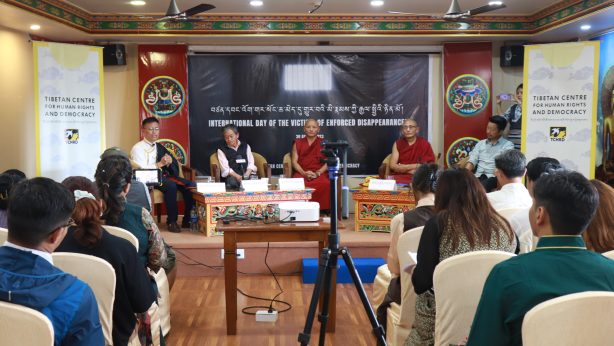Death in detention: Monk exposes China’s failure to protect Tibetans’ right to life
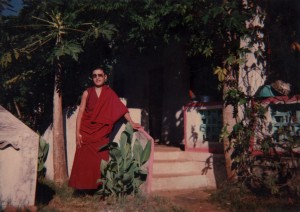
Nyima Dakpa Kyeri was a monk at Tawu Nyitso Monastery in Kardze (Ch: Ganzi) Tibetan Autonomous Prefecture in Sichuan Province. As a monk he studied among other things Tibetan history. Studying Tibetan history showed Nyima Dakpa how life in Tibet had been before the Chinese invasion. His studies took him to a time when Tibet was a strong, powerful empire. When he was not studying, Nyima Dakpa lived in a Tibet subject to Chinese atrocities. Nyima Dakpa had to act and make the disparity between the two known.
Starting in 1998 and into 1999, Nyima Dakpa posted fliers calling for Tibet to be free from the Chinese occupation. He posted seven fliers before he was arrested in Kardze. Then the beatings started. The authorities beat Nyima Dakpa until he thought of them as ‘devils’. They beat him until he confessed to posting the fliers. Then they beat him more. Nyima Dakpa was beaten until he lost consciousness and his leg broke. Then he was sent to Chengdu, the capital of Sichuan Province for sentencing.
TCHRD previously reported on Nyima Dakpa’s arrest, sentencing, and death. Since then TCHRD has received new, previously unknown details about Nyima Dakpa from Tibet, including photographs of Nyima Dakpa before and after his detention, and a handwritten letter describing his motivations, detention, and beatings.
Nyima Dakpa was sentenced to nine years in prison though he knew he would never actually spend nine years in prison. During only a few months in detention, Nyima Dakpa had almost been beaten to death. He would not survive nine more years. When he was arrested, Nyima Dakpa was a fit and healthy monk. On his deathbed, Nyima Dakpa was emaciated with a breathing tube attached to his nose, an IV attached to one arm and a heart rate monitor attached to the other. He died in 2003, four years after his arrest.
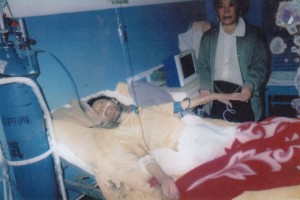
On 1 September 2001, Nyima Dakpa wrote a heartfelt appeal and the story of his arrest and detention. In it Nyima Dakpa wants the world to know about his treatment and for Tibet to become a free country as it used to be. He describes his treatment as “merciless”.
Following is the translation of Nyima Dakpa’s hand-written testimony:
A HEARTFELT APPEAL
Dear His Holiness the Dalai Lama and fellow Tibetan compatriots,
I am a Tibetan youth from Tawu, Kham. My name is Nyima Dakpa Kyeri. Like the proverbial ‘pika may not be a giant animal, but it is well developed with physical features,’ I am not a great scholar; nor am I a wealthy man but I am a person who has deep love for my people.
Therefore, I express the view that we Tibetan people have been reduced to a condition of backwardness and subjected to oppression, denying us even basic human rights, including the right to study our own language. I have studied over and again this subjected and oppressed condition, wherein we do not have any political rights.
Occasionally, I have also been able to study how our ancestral emperors established their political empire and power; I fully absorbed myself in the glorious sunshine of Tibetan history. Consequently, I made a firm decision in my heart that if ever I have to give up my life, I would do it for my people. So from the depth of my heart, I have had this earnest desire ‘how I wish if Tibetan people can regain true freedom and establish a Tibetan state.’
With such fervent desire in my heart, I pasted many leaflets on the walls of the buildings in Tawu on 9 September 1998, 10 November 1999, 12 November 1999, 19 November 1999, 6 December 1999, 29 December 1999 and 7 January 2000 respectively. The leaflets called for the ‘Chinese to leave Tibet and allow Tibet to become free.’ I have put my own signatures on the leaflets.
Unfortunately, without achieving any results, I nearly lost my life at the hands of the brutal Chinese. Last year when I was in Lhasa, on 22 March 2000, four security men from the Public Security Bureau (PSB) arrested me. Without even asking a question, they beat me up severely – to such an extent that I couldn’t utter a word. Denying even a morsel of food and a drop of water, I was put on a plane and taken to Chengdu.
At Chengdu I was handed over to some Chinese policemen, who again beat me up. The ‘devil-incarnate’ Chinese security forces were so brutal and merciless – they beat me up so severely that I almost lost my life. I lost my consciousness, and when I regained it, it was around 1 a.m. I found myself unable to move, as my whole body was in acute pain. In fact one of my legs had no sense of feeling, as if it was dead.
Ten days after reaching Tawu, I was subjected to another interrogation. Because of having experienced violent pain inflicted [by the police torture], I was compelled to reveal all my aspirations and confess to my pasting the leaflets. As a result, on 5 October 2000, the Intermediate People’s Court of Kardze Tibetan Autonomous Prefecture sentenced me to nine years of rigorous imprisonment. But at the moment I have become very weak physically due to suffering painful torture; I can’t even eat a morsel of food and one of my legs is broken. I am sure I will die shortly afterwards, but I am not going to be scared of dying – absolutely not.
At a time when the flow of my life-stream is on the verge of ceasing, whether I express it to my uncle Jowo Kyab or to fellow Tibetans, all I need is to make an appeal, through His Holiness the Dalai Lama, to advocate throughout the world that the Tibetan people are being bullied and subjected to brutal sentences.
Fellow Tibetan compatriots of the same flesh and bone, we must all be aware of the brutal humiliations we suffer at the hands of the Chinese – their illegal actions being committed [in Tibet]. We must, through every possible means, unite, and protest against China.
Nyima Dakpa Kyeri
1 September 2001

When Nyima Dakpa was describing the treatment that would ultimately kill him, he made a heartfelt appeal for the world to know about the merciless treatment of Tibetans so that conditions could change. Since then the PRC has had two periodic reviews at the United Nations, been admitted as a member of the United Nations Human Rights Council, released numerous white papers on human rights, and announced numerous reforms. The merciless treatment has not changed. In response to the crackdown on Tibetans in 2008, the People’s Armed Police in Sichuan Province also described their treatment of Tibetans as “merciless” and encouraged the officers by reminding them that they have full support of the Chinese government led by the Chinese president.
If anything the scope and scale of the merciless treatment of Tibetans has increased. Individually, Tibetans are still subject to the same treatment as Nyima Dakpa. As part of Xi Jinping’s (习近平) “mass-line” policy, Tibetans have been detained, beaten, and killed. Ngawang Jamyang was a Tibetan Buddhist scholar who was arrested on 23 November 2013. Less than a month later the police returned his body to his family. Like Nyima Dakpa, Ngawang Jamyang was healthy when he was detained and after his death his body bore unmistakable signs of beatings and torture. Unlike Nyima Dakpa, Ngawang Jamyang did not live long enough to be sentenced. When Sonam (name changed), a former student of Ngawang Jamyang, now living in Europe, learned of his teacher’s untimely death in police custody, he wrote “Fire of Sadness” (below). The tribute originally written in Tibetan has been translated by TCHRD.
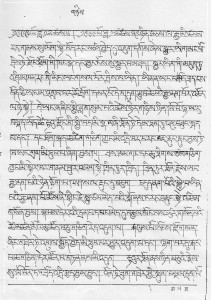
Despite all the years and all the promised reforms in the PRC the Tibetan intellectuals and monks are still being killed in detention by the Chinese authorities. If the PRC’s reform measures are going to have any meaning the PRC must stop arresting Tibetans for exercising their human rights and must treat the Tibetans they detain humanely.
Fire of Sadness
by Sonam
Pricked by the poisonous thorn of sadness
This agonizing pain of unendurable suffering
Even if expressed by 100,000 eminent poets
The words can partly express it
That I have expressed it here briefly
Is neither a poem nor a literary essay
But an expression of sad words meant to soothe my soul
Because of the rise of ocean-like waves of suffering
Like the sprinkling of the dew of lamentation
I have expressed only the edge of the strong feelings of my heart
Avoiding any ostentatious words
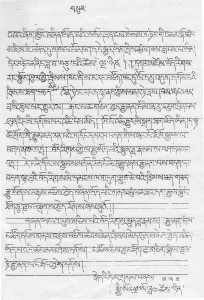
Noble father – Ngawang Jamyang-la
You are the sun of my humble soul
Although no one is there to listen
I couldn’t help but utter a few words of mourning for your departure
Although there’s no one who would wipe them out
Tears of sadness streamed down my face
Rich with the hearing, contemplative and meditative experiences
Your peaceful nature adorns the teachings of Buddha
In this age of 21st century
No one compares to you
In the knowledge of Buddhism and [modern] Science
Not only have you learned the knowledge for yourself
You also follow the path of serving humanity with joy
Because of dedicating your body, mind and soul
For a culture on the verge of dying
You had to depart early
The practice of truth and non-violence
You have embraced them without any outward imposition
No matter how much truth you have expressed
Amid the market that tramples on truthful information
All that they aim for is distortion [of your truth]
Although you haven’t committed any acts harming others
The violent forces
Seized all your rights
Including even your right to life
Are there any places where such injustices are inflicted?
The sun on this earth hasn’t disappeared
But the sun in my mind has disappeared suddenly
Dear Noble Father
You have departed this world too early and suddenly
Without heeding our requests
Dear Noble Teacher, you have departed too early
Even before the rise of the sun of reunion
What compelled you to depart suddenly?
Amid the wild, oppressive, terrifying darkness
And the moving dark clouds
Amid the destruction of thunder and hailstorms
Who will wipe out the tears of common folk?
Hope of our soul
The heart beat of our minds
The meeting of our consciousness
That Noble Father departed suddenly
Is not just a cause of today’s heartache
But akin to an impediment to the road of future happiness
Not just shedding tears for today
[Your departure] is like withering of a sprout
This deep wound of the mourning heart
Emerged without our choice for you
You have in no way inflicted it deliberately on us
Because of positive karma and prayers in in the past life
I have had the fortune to meet you in this life
Noble and learned father
You have taught me – a wanderer in distant lands
From the basic dialectics
To the profound six-perfection texts of Buddhism
I, the ignorant being, who do not see anything
A wanderer brought up amid sheep and goats [meaning nomadic boy]
You have taught me
With love and joy
The profound teachings of [the Buddha]
Today when I think about them
You smiling face, your voices of laughter
Appear in the mirror of my mind
When I remember your face
Reflected in the transparent wide mirror
My heart is pierced by the knife of painful memory
The wound of my heart is deep and incurable
Your sad departure today
Is just a narrow path filled with tears
Strewn with thorns of terror
The value of peace and justice has become more vague
Under the shameless deception of the oppressive forces
Amidst the unbearable days and nights of darkness
For the lonely slaves cursed by fate
Before the world disappears
Will there be a moment of sunshine
That will dispel the darkness wrought by tears of suffering?

